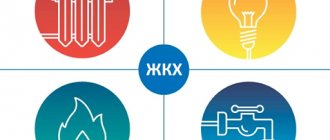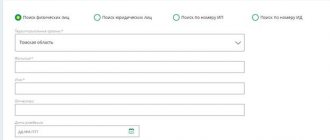Housing and communal services receive gigantic amounts of money each year. According to statistics, in 2021 the total debt of Russians to utility service providers is approximately 573 billion rubles.
From 01/01/2021, the accrual of penalties for debts will be restored. The ban on calculating penalties imposed due to the pandemic was in effect from 04/06/2020. How are utility debts collected?
In accordance with Part 1 of Art. 153 of the Housing Code of the Russian Federation, consumers of utility services are required to pay for the previous month by the 10th day of each month. If there is no payment, the payment will become overdue on the 11th.
The homeowners association has the right to choose a different date for paying utility bills with the consent of the owners (by a majority vote, when more than 50% agree with the change in date).
From whom should you demand repayment of debts for utility services?
If a debt arises, payment can be demanded from all owners, tenants and those registered jointly and severally.
Please note: in accordance with clause 29 of the Resolution of the Plenum of the Russian Armed Forces No. 22 of June 27, 2021, debts for utility services (with the exception of expense items for the maintenance of residential premises and major repairs) can be recovered from all owners and registered jointly. Each of them can be put forward a separate demand for repayment of the existing debt in full (in full).
When there is a change in the owner (tenant, tenant) of the property, debt on utility bills can be collected from both the new and the previous owner. The previous owner has obligations to pay all debts to housing and communal services, with the exception of debt for major repairs - this debt, in accordance with clause 3 of Art. 158 Housing Code of the Russian Federation, passes to the new owner.
Please note: the debt is registered on specific people with whom management companies sign an agreement, and not on real estate objects.
The only exceptions are inherited apartments (the heir is obliged to pay the entire utility debt).
Remember
In the Review of the RF Armed Forces on the pre-trial procedure for resolving disputes, there are several more cases and theses that are interesting to management organizations, for example:
- To prove that he has worked to pre-trial resolve the dispute with the defendant, the plaintiff must not only indicate this in his application, but also provide supporting documents. Otherwise, as indicated in paragraph 13 of the Review of the Supreme Court of the Russian Federation, the arbitration court has grounds to leave such an application without progress.
- If in the arbitration court of first instance the defendant did not state an argument about the plaintiff’s failure to comply with the pre-trial procedure for resolving the dispute, then this argument cannot be considered as a basis for canceling judicial acts in the appellate or cassation instance.
Administrative bodies conducting claims work with debtors should take into account the conclusions included in the Review of the RF Armed Forces and use them in their practice.
Extrajudicial methods of collecting utility debts
Extrajudicial methods of collection:
- Calculation of penalties and indication of these amounts in payment receipts for housing and communal services
Interest on the debt amount is accrued from the 31st day of delinquency. The interest rate is 1/300 of the rate of the Central Bank of the Russian Federation for each day until the debt is fully repaid. From 91 days of delay, the amount of the penalty increases to 1/130 of the rate of the Central Bank of the Russian Federation.
- Termination of services
If there is no payment for services for more than 3 months, gas, hot water, and electricity may be turned off. However, initially the debtor must send (hand over against receipt) a corresponding notice. After this, 20 days are allotted for voluntary payment of the debt.
Please note: the receipt of any amount to repay the debt, including the minimum of one hundred rubles per month, imposes a ban on disconnecting utilities.
In addition to a complete shutdown, you can temporarily (at certain hours throughout the day) suspend the provision of utility services. Or limit their provision by volume per month, week, etc. Such gentle options are recommended, especially if the debtor’s family has young children.
It is forbidden to turn off cold water and heating, or shut off the drainage system.
- Psychological impact, visits, calls
Often, you can get at least some amount to pay off the debt by making personal visits to the debtor without an aggressive attitude, as well as making polite calls with requests to close the debt.
At the pre-trial stage of collection, an automated contact center will increase the efficiency and speed of collection.
The organization of a contact center in a specialized CRM system for collection “BIT.Debt Management” occurs as follows:
- Automatic distribution of calls to an assigned manager
- Automatic dialing to non-contact debtors
- Call directly from the debtor’s card, where all information on the agreement and on past events is visible
- The operator's work is concentrated in one active window
- Minimizing the time to process one contract
- Minimizing the costs of training/retraining a new employee
- Building a call map for effective negotiations with the debtor
A controversial method is the publication of a list of debtors indicating the amount of debt and apartment numbers - on an announcement stand in front of the entrance to the entrance or in the entrance itself.
Please note: it is prohibited to indicate first and last names and other personal information of debtors. At the same time, judicial practice confirms permission to publish debt amounts and apartment numbers.
Please note that this method of influencing the majority of defaulters has a negative impact.
Features of debt collection for housing and communal services
Many people believe that work related to debt collection for housing and communal services is relatively easy and does not require serious professional training. Based on my own experience of working with management companies, as well as TSN and HOA, I would like to draw attention to such difficulties that arise when collecting debt for housing and communal services, such as:
- lack of information about the exact amount of debt;
- misunderstanding of the labor costs and difficulties that arise in the work of lawyers in this area of activity of management organizations (hereinafter referred to as MA);
- lack of even an approximate plan for collection and work with enforcement proceedings.
Let's consider each of these aspects in more detail.
Lack of information about the exact amount of debt
None of the management companies I worked with could immediately indicate the exact amount of debt for housing and communal services. Many will say that there is a lot of work, and information is constantly changing. In turn, I would like to note that this data is very important and the management of the educational institution is obliged to constantly update it, since this is, first of all, their income, on which the quality of services, the purchase of material and technical base, etc. directly depend. In addition, we should not forget that the prosecutor’s office, as a rule, once a year checks the collection of debts for housing and communal services in accordance with Art. 22 of the Law on the Prosecutor's Office, and in case of failure to provide information or lack of work to collect the debt, the PA may be brought to administrative liability under Art. 17.7 Code of Administrative Offenses of the Russian Federation.
Thus, the managers of the management company need to constantly check the amounts of debt for the apartment buildings that they service and have at least an approximate collection plan, otherwise the management company may be subject to administrative punishment, and this is a serious blow to its reputation.
Misunderstanding of labor costs and difficulties in the work of lawyers in this area
There is an opinion among some management authorities that the work of collecting debts for housing and communal services does not require a special approach or preparation: it is enough to have one specialist in this area - and the collection process will go by itself.
I think this is a serious misconception. Imagine a management agency serving more than a dozen apartment buildings. In every house, as a rule, there are debtors, and you need to work not with each house, but with each debtor individually. In this regard, time and labor costs increase by an order of magnitude. In parallel, work is underway on enforcement proceedings and forwarding claims to debtors – legal entities. Moreover, despite applications for the issuance of a court order or claims to legal entities, there is still a category of persons who fundamentally disagree with the payment of debts for housing and communal services and appeal applications for the issuance of court orders, as a result of which there is a need to file a claim in the courts. This significantly slows down the collection work, since much more time and documentation is required for claims for collection of debts for housing and communal services than for similar applications in the order of writ proceedings.
In small organizations, as well as TSN and HOA, the functions of legal services are often combined with secretarial activities and other administrative and economic functions. Imagine the amount of work lawyers do: this includes preparing responses to citizens’ requests, and participating in judicial, including administrative, processes to represent the interests of the company, and working with government agencies and organizations, creating local regulatory legal acts of the organization and checking them for compliance legislation, as well as work within the framework of inspections of government agencies, consultations with various departments and employees, contractual work and debt collection for housing and communal services. It often happens that even in large educational institutions all of the above functions are performed by one person. I believe that all this leads to destabilization of the lawyer’s work, his excessive workload and, as a result, routine, which makes it very difficult to allocate time specifically for debtors.
In this regard, I believe that it is possible to resolve these issues only by clearly planning the activity and its directions for the lawyer, as well as preferably dedicating two specialists directly to the work of debt collection, since many management companies have huge amounts of receivables and one person is physically unable to able to cope with this task. For example, as the head of the Russian Ministry of Construction, Vladimir Yakushev, noted at a meeting of the President of Russia with members of the government, “the total debt in the housing and communal services sector of Russia is not decreasing and currently amounts to about 1.3 trillion rubles.” At the same time, he added that of the said amount, the debt of the population is about 810 billion rubles, of budgetary organizations - 60 billion rubles, and other consumers owe 400 billion rubles.
As you can see, the collection of debts for housing and communal services must be treated with special care. To successfully work in this direction, it is necessary to have two employees in the organization, one of whom will be exclusively engaged in compiling a list of debtors, calling them, as well as collecting and preparing documents for the issuance of court orders with their subsequent transfer to the FSSP, and the other - representing the interests of the company in legal proceedings for debt collection.
It is advisable to divide the work on enforcement proceedings between the specified employees, one of whom will conduct enforcement proceedings within the framework of the court orders that have entered into force, and the other - the issued writs of execution.
Lack of even an approximate plan for collection and work with enforcement proceedings
In my opinion, it is impossible to organize collection work without a plan and deadlines for its implementation - otherwise, red tape and confusion in documentation are possible, which will lead to destabilization of debt collection activities for housing and communal services. To solve the problem, I propose an approximate instruction plan consisting of three blocks:
- claims work with legal entities;
- claims work with owners (tenants) of residential premises;
- enforcement proceedings.
However, first of all, it is necessary to determine the amount with which you can begin debt collection work.
Firstly, we can take as a basis the norm of clause 118 of the Decree of the Government of the Russian Federation of May 6, 2011 No. 354 “On the provision of utility services to owners and users of premises in apartment buildings and residential buildings,” which states that under incomplete payment by the consumer of utility services it is understood that he has a debt to pay for one utility service in an amount exceeding the sum of two monthly fees for a utility service, calculated based on the standard of its consumption, regardless of the presence or absence of an individual or general (apartment) meter and tariff (price) for the corresponding type resources valid on the day of restriction of the provision of utility services, provided that there is no agreement on debt repayment concluded between the consumer-debtor and the executor and (or) if the consumer fails to comply with the terms of such an agreement.
If the consumer does not fully pay for all types of utility services provided, the contractor calculates the debt for each of them separately. Thus, the amount of debt is an amount that more than doubles the amount of payment for housing and communal services. However, if the debtor lives in “old” houses (for example, five-story buildings), where the amount of payment for housing and communal services is relatively small and does not exceed the minimum wage in the city or the average salary, in my opinion, there is no reason to begin collection immediately in court, since the amount will be quite small.
Secondly, determining the amount of debt based on the minimum wage for the region. This amount may already be more than two housing and communal services payments, but it is still relatively small.
Thirdly, determining the amount of debt based on the average salary in the city or region. I believe this is the optimal amount, which is quite significant for starting work on debts for housing and communal services in full, including the judicial stage.
Claim work with legal entities
It is advisable to divide this block into two parts: work on collecting debts for housing and communal services from legal entities in writ proceedings (for individual entrepreneurs and legal entities with a claim amount of up to 50 thousand rubles) and in the general procedure for considering disputes in an arbitration court (over 500 thousand . rub.).
The work is divided into stages:
- request and receipt of a list of debtors in the accounting department;
- calling debtors, drawing up a work plan with each of them;
- resolving the issue of concluding agreements on installment payment of debts for housing and communal services;
- drawing up a claim against a list of debtors;
- sending claims by mail, courier;
- compiling a register of submitted claims;
- monitoring the timing of claims, checking the status of payment;
- sending documents to the arbitration court for the issuance of enforcement orders or to initiate legal proceedings;
- checking the results of the court issuing executive orders and initiating arbitration cases (after initiating court cases - sending the necessary explanations, petitions (to freeze accounts), objections to reviews, etc.);
- conducting legal proceedings, obtaining a court decision, an executive order, resolving the issue of appeal, sending enforcement documents to the FSSP.
Claim work with owners (tenants)
The algorithm for collecting debts from owners (tenants) of residential premises is practically similar to collecting from legal entities, with the exception of a mandatory claim.
However, it is important to pay attention to the identifiers of debtors (Article 131 of the Code of Civil Procedure of the Russian Federation), which the management organization may not have. In this case, it makes sense to look for the missing data in the passport office, contracts and other documents. If any identifiers are missing, we recommend indicating their absence in the claim or application for the issuance of court orders. In the operative part of the application, it is important to draw the attention of the court so that it must indicate this identifier in its decision, otherwise the executive document will not be accepted by the FSSP in accordance with subsection. “a” clause 5, part 1, art. 13 of the Law on Enforcement Proceedings.
Enforcement proceedings
Work with enforcement proceedings is also divided into two blocks:
- checking and conducting existing enforcement proceedings;
- exciting and leading new ones.
The first block includes:
- compiling a register of filed enforcement documents and forming cases for each of them;
- drawing up and sending applications to the departments of the FSSP of Russia to submit a report on the enforcement actions of bailiffs;
- receiving reports on enforcement actions, analyzing them, determining the need for personal acquaintance with proceedings regarding which there are questions;
- drawing up an action plan after familiarization (sending petitions, complaints, statements to bailiffs, the FSSP department for the region, prosecutors and other government agencies);
- compiling a register of completed actions in enforcement proceedings;
- monitoring results and receiving responses to petitions, applications and complaints; determination of further actions in enforcement proceedings.
The second block includes the following necessary actions:
- drawing up applications for the initiation of enforcement proceedings for legal entities and individuals (if possible, it is advisable to group submitted applications for each house separately);
- sending these applications to the FSSP departments by courier or by mail;
- compiling registers of submitted applications to initiate enforcement proceedings;
- obtaining orders to initiate enforcement proceedings;
- determination of deadlines for completion of enforcement proceedings, verification of payment for them.
I also recommend that before the end of the collection period for enforcement proceedings against debtors for whom collection has not been carried out, you personally familiarize yourself with the materials of the enforcement proceedings and photograph them. Then draw up the necessary petitions, complaints and submit them. It is mandatory to draw up a register of actions taken within the framework of enforcement proceedings. After this, monitor judicial acts issued based on the results of consideration of complaints and applications, and make decisions on the further fate of such enforcement proceedings.
In conclusion, I would like to draw attention to the general schedule (plan) of work on collecting debts for housing and communal services. In my opinion, we should take all debtors in one house as a basis and work on it, subsequently moving on to the next houses. If one lawyer is working on collection, it makes sense to devote the first week to preparing documents for the court, including compiling a register of debtors, calling them, concluding installment agreements for the repayment of debts for housing and communal services, drawing up claims, as well as statements to the court.
You should definitely set aside a working day (or half) to check the documents compiled, even if they seem to be of the same type. This is a very important detail when working with documents, since the human factor cannot be canceled and anyone can make a mistake. Otherwise, a situation may arise when a lawyer sends many applications to the court with a lot of technical errors and typos. I would like to remind the management of the administrative organization that lawyers compile a huge amount of documents, and, unfortunately, mistakes always happen to everyone. Therefore, in order to provide specialists with the opportunity to collect a lot and effectively, either turn a blind eye to errors that are not significant (typos or misspellings in words), or allow a day to check and correct documents before sending them.
The second week should be devoted exclusively to preparing a position and drawing up documents on pending claims for debt collection in the courts. It is advisable to allocate the third week for enforcement proceedings, and devote the fourth to summing up the results of the work, receiving responses to applications, petitions, complaints and working with them, drawing up plans for further collection.
Pre-trial methods of collection: filing a claim
Homeowners' associations and management companies can file claims in court without following the pre-trial procedure for resolving the dispute. If the debtor is a legal entity, filing a claim is mandatory.
We advise you not to refuse pre-trial proceedings with defaulters. The debtor, having received official demands with a warning about the possibility of litigation, calculations of the amount of debt and penalties, can begin to repay the debt in parts or completely close the debt.
At the judicial stage of collection, a large amount of time is spent on creating standard documents, in which only information about the debtor and the contract actually changes. This problem could be solved using a mechanism for mass creation of electronic documents based on a template.
A tool for generating electronic documents using custom templates will help you generate the necessary documents for the selected pool of cases in one click.
General meeting
Chapter 9.1 of the Civil Code specifies the requirements that the minutes of the general meeting must meet. Mandatory document details:
- place of compilation;
- date of the protocol;
- form of the meeting;
- required quorum at the meeting;
- agenda;
- voting results by issue - “for”, “against”, “abstained”;
- information about the persons who carried out the vote count.
If the minutes of the general meeting do not contain the listed information, the general meeting may be cancelled. The Civil Code specifies the reasons for filing an appeal against the minutes of a general meeting, for example, if the owner was not notified of the meeting or voted against it. In this case, he has six months to appeal the protocol. If the owner abstained during voting, then it will not be possible to appeal the decision. If the number of votes of the owner is not reflected in the voting results, the general meeting also cannot be declared invalid.
Filing a claim in court
The debt can be “settled” in the magistrate’s court - this option is the fastest. The court order will be issued within 5 days.
If within 10 days from the receipt of the letter with the court order the defaulter does not file a petition with the court to cancel the order, a writ of execution will be issued to be submitted to the Bailiff Service and the banks in which the debtor has an account.
If the order is cancelled, the claim must be sent again:
- To the district (city) court, if the amount of debt, including penalties, is more than 100 thousand rubles;
- To the magistrate's court if the amount of debt, including penalties, is less than 100 thousand rubles.
The rules for filing a claim are specified in Art. 131 Code of Civil Procedure.
At any stage of the trial, a settlement agreement can be concluded with the defaulter. For example, if the debtor has a new job and he agrees to pay off his debts.
Amounts of state duties
The amount of fees for filing claims in courts of general jurisdiction and arbitration courts will differ. The fee for a claim for collection of non-payments in the magistrate's court is set as a percentage. For a statement of a non-property nature, for example, about recognizing the actions of the owner as invalid, the state fee is 4 thousand rubles. For supervisory appeals, the fee is 50% of the initial fee. The amount of the fee to the arbitration court is calculated using a similar scheme, but in this case the amount for monetary claims will be different.
Changes are regularly made to the Tax Code, including changes to the amounts of state duties. In case of incomplete payment of the fee, the judges will leave the claim without progress. If the amount of the fee is large and there are not enough available funds, an application to reduce the amount of the fee is drawn up. But this will require a strong economic justification:
- difficult financial situation;
- a large number of debtors, while the plaintiff company fulfills its obligations to resource supply companies in a timely manner. If there are reconciliation reports, you can attach copies of them and a summary table of the total amount of debt for the object.
The plaintiff may ask to be exempted from paying the fee completely or to reduce the amount of the fee and assign obligations to the defendant.
Collection through the FSSP of the Russian Federation
The bailiff service can:
- Sell the debtor's property to pay off the debt;
- Write off funds from bank accounts (up to 50% of any income);
- Seize property and accounts, ban foreign travel.
As part of enforcement proceedings, other debt collection measures may be applied.
If after more than 6 months the FSSP cannot receive funds from the defaulter, the writ of execution will be returned and a decision will be made to complete the enforcement proceedings.
But utility service providers have the legal right to re-apply to the FSSP after six months. And if there is evidence that the financial situation of the defaulter has changed, according to clause 5, art. 46 of Law No. 229-FZ, they can do this at any other time before the expiration of the limitation period (3 years from the date of entry into force of the court decision, in accordance with Article 21 No. 229-FZ).
Using the integration with the FSSP portal built into the BIT.Debt Management program, you can obtain open data on enforcement proceedings of individuals provided by the resource of the Federal Bailiff Service (hereinafter referred to as FSSP) fssprus.ru.
- Obtaining complete information on all past and current debts of a person;
- The ability to assess whether the debtor has movable and immovable property that can be recovered;
- Ability to assess the debtor’s solvency;
- The ability to add any information you need to the downloaded data from the FSSP into the program;
- The ability to receive information about bailiffs: full name, phone number for effective tracking of enforcement proceedings;
- Ability to upload information on debtors to BIT.UZ according to a given schedule.
Eviction of debtors
Eviction is permitted if the period of delay is more than six months. However, eviction is possible only for those citizens who live under a social tenancy agreement and subject to the provision of other living space of at least 6 m2 per registered person.
Eviction from privatized housing is impossible.
BIT.Debt management is a specialized CRM system for collecting housing and communal services debts at all stages.
- Accounting for overdue periods;
- Downloading data from the EIRC;
- Processing data from OSV;
- Debt accounting by owner;
- Debt management by personal accounts.
More details Request a demo








